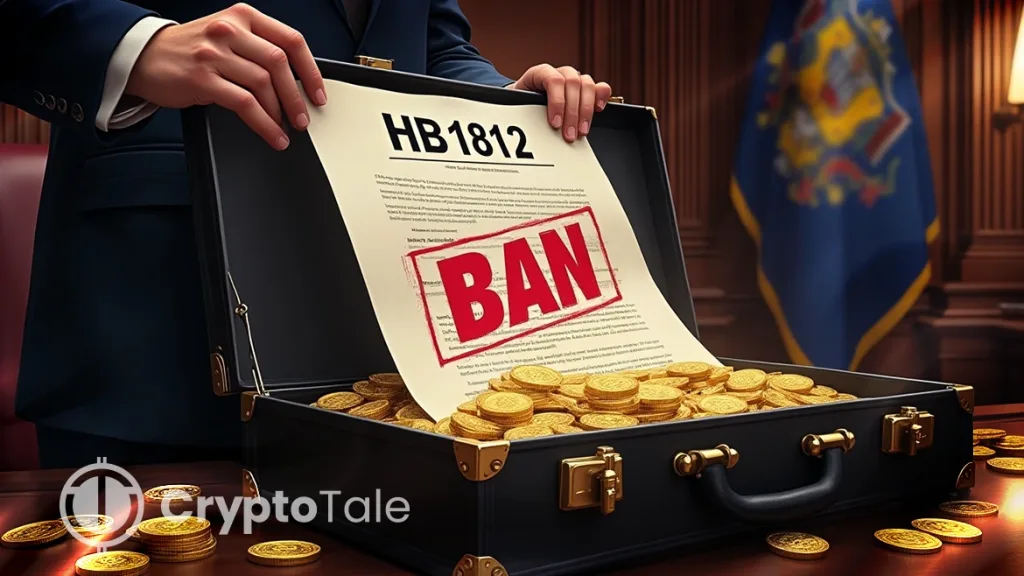Pennsylvania Bill HB1812 Bans Crypto for Public Officials

- Pennsylvania’s HB1812 bans public officials from holding or trading crypto assets.
- HB1812 extends restrictions to families and requires disclosure of digital holdings.
- The bill targets corruption risks linked to memecoins, NFTs, and political crypto ties.
Pennsylvania is moving to tighten ethical rules for the digital era with the introduction of HB1812, a bill that bars public officials and their families from holding or trading cryptocurrencies. The proposal comes as memecoins, NFTs, and token-linked political campaigns attract national attention.
The bill comes at a time when digital assets are under increased attention in politics. According to the proponents, the bill tightens loopholes and enhances accountability. This raises concerns about enforcement and whether crypto-savvy officials will be sidelined from public service.
Waxman’s Push Against Crypto Profiteering
Ben Waxman, a Democrat representing District 182, introduced HB1812 with eight co-sponsors, framing it as a response to corruption at the federal level. Waxman accused President Donald Trump of financially benefiting from crypto projects like his memecoin, Official Trump.
He claimed Trump pushed policies to roll back federal oversight of crypto markets. According to Waxman, those moves shielded projects tied to political figures from scrutiny, and HB1812 aims to prevent similar exploitation in Pennsylvania.
“In Pennsylvania, no public official should be allowed to use their office to enrich themselves through cryptocurrency schemes,” Waxman said. He stressed that the bill prohibits launching, promoting, or trading in coins where officials hold a financial stake.
Comprehensive Restrictions and Federal Echoes
HB1812 goes further than most existing ethics statutes, requiring disclosure of digital assets worth more than $1,000, including indirect holdings through family or funds. Public officials must divest such assets within 90 days of the law’s passage.
The bill bars officials from trading or promoting crypto during their terms and for one year after leaving office. Restrictions extend to family members to prevent backdoor profiteering. Violations could result in penalties up to $50,000 or felony charges for up to five years in prison.
Notably, the HB1812 bill bans Bitcoin, stablecoins, altcoins, and even their derivatives, including ETFs and trusts. By doing so, the bill prevents officials from bypassing rules through indirect or lightly regulated investments. The measure also updates Title 65 of Pennsylvania’s ethics code.
Supporters link HB1812 to broader federal momentum. Lawmakers in Washington have introduced bills like the COIN Act and MEME Act that target profiteering by presidents and members of Congress through digital assets. Congressman Ritchie Torres and Senator Adam Schiff back proposals that mirror Pennsylvania’s approach.
The Pennsylvania bill points to federal examples involving the misuse of office by officials to advance their own crypto interests. By aligning with national debates, HB1812 aims to regain citizens’ trust and protect policy decisions against market speculation.
Related: SEC Mobilizes to Modernize Crypto Rules, Embracing Trump-Era Policies
Rising Ethical Stakes in the Digital Era
Analysts see HB1812 as part of efforts to modernize public ethics to the blockchain era. The bill recognizes the dangers of memecoins, NFTs, and politically branded tokens, while officials with a financial interest in these projects may be able to influence policy in ways that erode transparency.
Yet challenges remain. Blockchain’s complexity makes monitoring and enforcement difficult. Concern remains on how the state agencies will trace crypto holdings, particularly the ones that are concealed via decentralized systems or layered finances.
Other critics have pointed out that the bill will turn away crypto-savvy officials from seeking office. Pennsylvania must balance between competence and the advantages of entrusting the leadership to those who are aware of the latest technologies.
HB1812 sets a 60-day implementation period after passage, reflecting urgency as crypto markets intersect more deeply with politics. For now, Pennsylvania has placed itself at the forefront of state-level action, echoing federal initiatives while charting its own course.